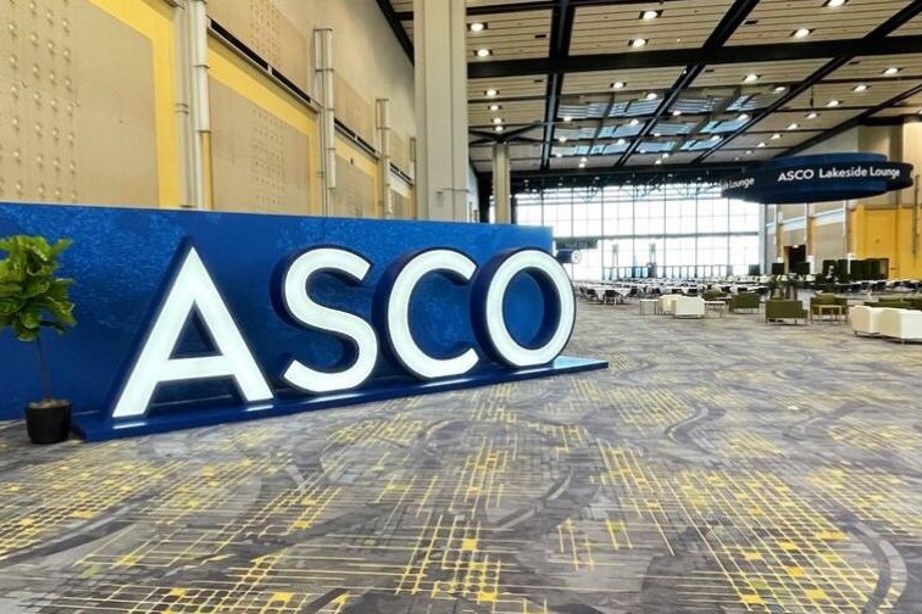ASCO 2022: a glance at some highlights of this annual meeting

In 2022, the American Society of Clinical Oncology (ASCO) congress was held live in Washington DC with a possibility to participate online. The event presented some breakthroughs in cancer research of the last year. We at Alcimed summarized some of the most important discoveries discussed at the ASCO 2022 congress, which were centered on breast cancer, lymphoma, cancers of the gastrointestinal tract and bladder cancer.
Innovations in breast cancer at ASCO 2022
DESTINY-Breast04
At this 2022 edition of ASCO, the most striking news was probably about a human epidermal growth factor receptor 2 (HER2) therapy. For metastatic breast cancer patients with a low HER2 expression (previously graded as HER2 negative), the phase-III trial DESTINY-Breast04 could show that second-line treatment with HER2-directed trastuzumab deruxtecan (T-DXd) was superior to the standard-of-care-treatment, resulting in a significantly higher progression-free (PFS) as well as overall survival (OS) in these patients. PFS went from 5.4 months to 10.1 months, and OS increased from 17.5 to 23.9 months.
This is the first time that a HER2-directed therapy identifies a HER2-low population and supports the use of T-DXd in the indication of HER2-low cancers (previously HER2 negative).
Additionally, this therapy is effective in HER2-low breast cancer irrespective of the hormone receptor (HR) status, i.e. it also works in HER2-low/HR negative patients previously known as triple negative breast cancer patients, a population very hard to treat.
MAINTAIN
Another ASCO 2022 congress finding on this breast cancer indication was studied by MAINTAIN, a phase-II trial that investigated the role of ribociclib treatment for ER-positive, HER2-negative breast cancer patients. The patients included had already gotten an CDK4/6 inhibitor (palbociclib, pribociclib, palbociclib, abemaciclib or other) and switched to endocrine therapy, either fulvestrant or exemestand after a progression of the tumor. This was done either supplemented with ribociclib or not. The combination with ribociclib was able to improve the PFS significantly from 2.76 to 5.33 months. This study included data up until 12 months after treatment and shows a promising effect of additional ribociclib for HER2-negative, ER-positive breast cancer patients.
Learn more on our Oncology Exploration Center >
Innovations in lymphoma treatment at ASCO 2022
ECHELON-1
In classical Hodgkin lymphoma, a phase-III trial was conducted to examine the use of brentuximab vedotin with chemotherapy including doxorubicin, vinblastine, and dacarbazine in comparison to the exchange of brentuximab with bleomycin. Due to this, the OS significantly increased from 39 to 64 months and a non-significant increase of 6-year PFS was estimated as well. There was no loss in safety issues due to brentuximab. Authors concluded a benefit of this therapy over the control group, showing a progression in Hodgkin lymphoma treatment.
Innovations in colon and rectal cancer at ASCO 2022
PARADIGM
The so-called PARADIGM phase-III trial evaluated the efficacy of panitumumab in comparison to bevacizumab, both in combination with the standard doublet first-line chemotherapy consisting of Leucovorin, 5-Fluorouracil und Oxaliplatin, called mFOLFOX6 to treat metastatic colorectal cancer (mCRC) and left-sided primary tumors. Authors could show that patients in Japan with left-sided mCRC as well as WT RAS, so those mCRC that do not show a mutation in commonly mutated RAS genes, the OS rate improved significantly versus the combination with bevacizumab, while PFS did not. These results presented at ASCO 2022 could form a first-line treatment cure for patients with mCRC.
Dostarlimab in Rectal Cancer
In an effort to treat mismatch repair deficient rectal cancer patients in which neoadjuvant chemotherapy combined with radiation and rectal resection is inefficient, a phase-II study evaluated the use of dostarlimab prior to the standard treatment. Dostarlimab is a PD-1 monoclonal antibody, and these patients are responsive to PD-1 blockade. Strikingly, the study could show a 100% (12 patients) clinical complete response (cCR), so no residue of cancer tissue was detected after the treatment within 25 months. This is a promising result for patients with advanced rectal cancer and awaits longer study trials.
DYNAMIC
The DYNAMIC phase-II trial set focus on stage II colon cancer and the potential of circulating tumor DNA (ctDNA) after adjuvant chemotherapy as a marker relative to recurrence-free survival. Authors were able to show that in patients that do not express ctDNA, adjuvant chemotherapy is not necessary and omitting this will not lower recurrence-free survival. Therefore, ctDNA is an interesting marker to assess whether adjuvant chemotherapy is helpful in patients with stage II colon cancer.
Innovations in bladder cancer at ASCO 2022
QUILT-3.032
A phase-II trial on non-muscle invasive bladder cancer patients that show no improvement through Bacillus Calmette-Guerin (BCG), the most common immunotherapy for bladder cancer, were shown to have a complete response rate for 2 years of an astonishing 70% using an IL-15 enhancer, N-803. This was a multicenter study and reveals a promising approach for bladder cancer.
All in all, the ASCO 2022 congress was an eye-opening event for HER2 breast cancer and further, exciting findings. To continue to follow the latest advances in oncology and discover our expertise, visit our Oncology Exploration Center.
About the authors,
Volker, Great Explorer Oncology, and Saida, Consultant in Alcimed’s Healthcare team in Germany
Have a project?
Our explorers are ready to discuss it with you